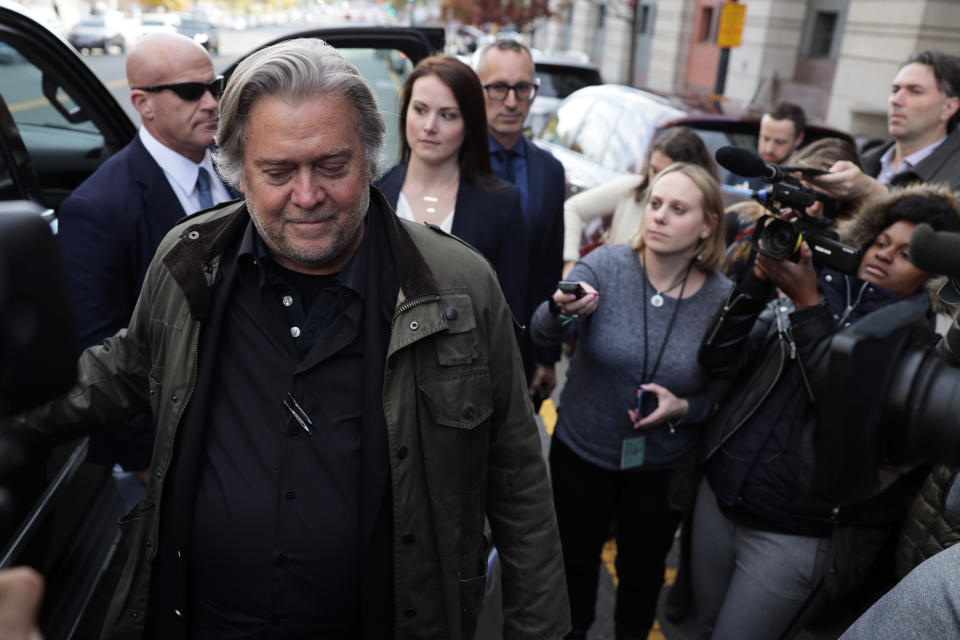Steve Bannon, revealed as a petty grifter
Steve Bannon was worth as much as $48 million when he got involved in the scam that may end up sending him to prison. Bannon enjoyed worldwide fame, or at least notoriety, as the kingmaker who got Donald Trump elected president of the United States in 2016, against long odds. He ran a portfolio of media and consulting companies that did work for populist politicians and other clients all over the world.
Bannon is now an accused felon, charged with helping run a scheme that siphoned off donor funds at a conservative nonprofit for his own use, and that of three others. The Coast Guard ferried federal agents to a yacht Bannon was on off the coast of Connecticut on August 20, arresting him on Long Island Sound. They jailed Bannon in Manhattan until he posted $5 million bail and surrendered his passport. Bannon pleaded not guilty.
Trump’s top strategist joined the alleged scam after leaving an 8-month stint as a senior White House advisor to Trump. Bannon remained influential in Trumpworld and in the Republican Party following his departure from official government work. But he was obviously tempted by the allure of what must have seemed like easy money. Add one more entry to the endless tally under hubris in the history of people who thought they’d never get caught.
Around the beginning of 2019, Bannon joined forces with Brian Kolfage, a former Air Force enlistee who lost both legs and an arm in a surprise attack at a base in Iraq in 2004. After Trump won the White House in 2016, Kolfage ran some lowbrow conservative media sites. Then in late 2018, he found surprising success with a GoFundMe campaign soliciting private donations to help pay for Trump’s border wall. The campaign raised $20 million within days, leading to scrutiny of Kolfage, who wasn’t affiliated with any nonprofit at the time. GoFundMe suspended the campaign and told Kolfage it would withhold the funds unless he partnered with a legitimate nonprofit that would manage the money.
Money from ‘We Build the Wall’
That’s when Bannon entered the picture. The indictment in the case says Kolfage “involved” Bannon, without saying who approached whom. However it transpired, Bannon became the de facto boss, helping Kolfage set up a nonprofit called We Build the Wall, where Bannon served as chairman of the Advisory Board. Unknown to the public, Bannon also began to run some of the group’s donations through his own nonprofit, called Citizens of the American Republic, or COAR. That’s one way the fraud supposedly occurred.

Kolfage said publicly many times that he and the others associated with We Build the Wall would “not take a penny” for themselves from the donations that came in. But they did, apparently. Investigators obtained emails and text message between Bannon, Kolfage and two others discussing how they were fooling donors. The group did fund some wall-building, but money began to flow from the Kolfage nonprofit to the Bannon nonprofit and then back to Kolfage personally, with Bannon keeping some and Kolfage pocketing the rest, according to the Justice Department allegations.
It got more elaborate. A Kolfage crony named Tim Shea, a real estate broker in Castle Rock, Colo., set up at least one shell company that funneled donated money to Kolfage, keeping a cut for himself. A fourth defendant, Andrew Badolato, who helped Bannon run COAR, began to make payments for bogus work using donor funds that ended up in Kolfage’s pocket.
All told, Kolfage, who pledged not to take a penny, got about $350,000 in donor funds, according to the indictment. He used the money to remodel his home, buy a boat and a Land Rover, and cover other personal expenses. Bannon got over $1 million, though some of that went to Kolfage. The indictment doesn’t say how much Badolato and Shea squeezed out of the scheme. The alleged grifting stopped after the group got wind of an investigation in the fall of 2019.

For Bannon, it’s a remarkably petty way to crash. Bannon’s zig-zaggy career includes 7 years as a naval officer, a Harvard MBA, and three years as a banker at Goldman Sachs. A financing firm he formed in Los Angeles in the 1990s earned a windfall from the TV comedy “Seinfeld.” He was a co-founder of Breitbart News in 2007 and returned there after leaving the White House in 2017.
Why risk all that for a garden-variety scam that drew scrutiny from the outset? Was Bannon deep in debt and desperate, as Paul Manafort was when he committed the crimes that ultimately sent him to prison? Was he so greedy he was blind to risk? Or was Bannon a scammer all along, who just took a long time to get caught? As the case proceeds, maybe we’ll find out.
Bannon wasn’t the only well-known American giving We Build the Wall a whiff of legitimacy. Its advisory board also includes former Kansas secretary of state Kris Kobach, who ran unsuccesfuly for Kansas governor in 2018. Also on the advisory board: Erik Prince, founder of the controversial Blackwater private-security group, former Congressman Tom Tancredo of Colorado, and retired Major League Baseball pitcher Curt Schilling. None have been charged in the fraud, and as volunteer advisors with no operational role in the nonprofit, they can plausibly claim to have been in the dark. But they’re all Trump supporters who back his anti-immigration agenda—and probably just learned a lesson about gullibility.
Rick Newman is the author of four books, including “Rebounders: How Winners Pivot from Setback to Success.” Follow him on Twitter: @rickjnewman. Confidential tip line: rickjnewman@yahoo.com. Encrypted communication available. Click here to get Rick’s stories by email.
Read more:
Get the latest financial and business news from Yahoo Finance
Follow Yahoo Finance on Twitter, Facebook, Instagram, Flipboard, SmartNews, LinkedIn, YouTube, and reddit.
